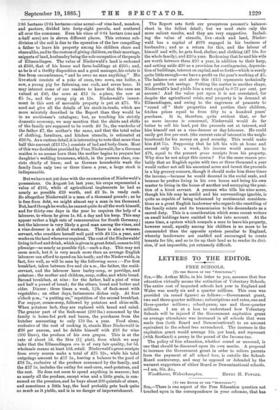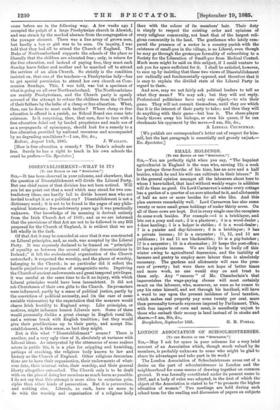LTO THE EDITOR OF THE " SPECTATOR." J
Sut.,—There is one aspect of the Free Education question not touched upon in the correspondence in your columns, that has
come before me in the following way. A few weeks ago I occupied the pulpit of a large Presbyterian church in Alnwick, and was struck by the marked absence from the congregation of the younger element. There was a fine array of grown men, but hardly a boy or girl was to be seen. On inquiry, I was told that they had all to attend the Church of England. The Duke of Northumberland supports the schools of the place so liberally that the children are educated free ; only, in return for the free education, and instead of paying fees, they must each Sunday leave father and mother and be marched off to attend the services of an alien Church. So strictly is the condition insisted on, that one of the teachers—a Presbyterian lady—has to get special permission to attend her own church on Com- munion Sundays. This, I was told, was but a specimen of what is going on all over Northumberland. The Northumbrians are mainly Presbyterians, and the Church party is openly accused of the attempt to seduce the children from the Church of their fathers by the bribe of a cheap or free education. What, then, can be done to meet such tactics ? Where cheap or free education is offered in a parish, no School Board can come into existence. Is it surprising, then, that men, face to face with a free education doled out by landed proprietors and made use of as a propaganda of episcopacy, should look for a remedy to a free education provided by national resources and accompanied by no degrading conditions ?—I am, Sir, &c., Bedcar, August 14th, 1885. J. WALLACE.
[How is free education a remedy P The Duke's schools are free. Surely he has a right to teach in his own schools the creed he prefers.—En. Spectator.]



































 Previous page
Previous page